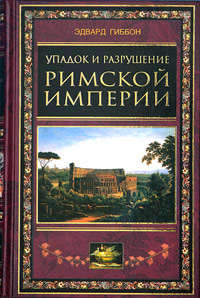
Полная версия
History of the Decline and Fall of the Roman Empire - Volume 2
But he had scarcely finished the term of his annual magistracy, when, on a slight pretence, he was condemned and executed; Domitilla was banished to a desolate island on the coast of Campania; and sentences either of death or of confiscation were pronounced against a great number of who were involved in the same accusation. The guilt imputed to their charge was that of Atheism and Jewish manners; a singular association of ideas, which cannot with any propriety be applied except to the Christians, as they were obscurely and imperfectly viewed by the magistrates and by the writers of that period. On the strength of so probable an interpretation, and too eagerly admitting the suspicions of a tyrant as an evidence of their honorable crime, the church has placed both Clemens and Domitilla among its first martyrs, and has branded the cruelty of Domitian with the name of the second persecution. But this persecution (if it deserves that epithet) was of no long duration. A few months after the death of Clemens, and the banishment of Domitilla, Stephen, a freedman belonging to the latter, who had enjoyed the favor, but who had not surely embraced the faith, of his mistress, * assassinated the emperor in his palace. The memory of Domitian was condemned by the senate; his acts were rescinded; his exiles recalled; and under the gentle administration of Nerva, while the innocent were restored to their rank and fortunes, even the most guilty either obtained pardon or escaped punishment.
II. About ten years afterwards, under the reign of Trajan, the younger Pliny was intrusted by his friend and master with the government of Bithynia and Pontus. He soon found himself at a loss to determine by what rule of justice or of law he should direct his conduct in the execution of an office the most repugnant to his humanity. Pliny had never assisted at any judicial proceedings against the Christians, with whose lame alone he seems to be acquainted; and he was totally uninformed with regard to the nature of their guilt, the method of their conviction, and the degree of their punishment. In this perplexity he had recourse to his usual expedient, of submitting to the wisdom of Trajan an impartial, and, in some respects, a favorable account of the new superstition, requesting the emperor, that he would condescend to resolve his doubts, and to instruct his ignorance. The life of Pliny had been employed in the acquisition of learning, and in the business of the world. Since the age of nineteen he had pleaded with distinction in the tribunals of Rome, filled a place in the senate, had been invested with the honors of the consulship, and had formed very numerous connections with every order of men, both in Italy and in the provinces. From his ignorance therefore we may derive some useful information. We may assure ourselves, that when he accepted the government of Bithynia, there were no general laws or decrees of the senate in force against the Christians; that neither Trajan nor any of his virtuous predecessors, whose edicts were received into the civil and criminal jurisprudence, had publicly declared their intentions concerning the new sect; and that whatever proceedings had been carried on against the Christians, there were none of sufficient weight and authority to establish a precedent for the conduct of a Roman magistrate.
Chapter XVI: Conduct Towards The Christians, From Nero To Constantine.—Part III.
The answer of Trajan, to which the Christians of the succeeding age have frequently appealed, discovers as much regard for justice and humanity as could be reconciled with his mistaken notions of religious policy. Instead of displaying the implacable zeal of an inquisitor, anxious to discover the most minute particles of heresy, and exulting in the number of his victims, the emperor expresses much more solicitude to protect the security of the innocent, than to prevent the escape of the guilty. He acknowledged the difficulty of fixing any general plan; but he lays down two salutary rules, which often afforded relief and support to the distressed Christians. Though he directs the magistrates to punish such persons as are legally convicted, he prohibits them, with a very humane inconsistency, from making any inquiries concerning the supposed criminals. Nor was the magistrate allowed to proceed on every kind of information. Anonymous charges the emperor rejects, as too repugnant to the equity of his government; and he strictly requires, for the conviction of those to whom the guilt of Christianity is imputed, the positive evidence of a fair and open accuser. It is likewise probable, that the persons who assumed so invidiuous an office, were obliged to declare the grounds of their suspicions, to specify (both in respect to time and place) the secret assemblies, which their Christian adversary had frequented, and to disclose a great number of circumstances, which were concealed with the most vigilant jealousy from the eye of the profane. If they succeeded in their prosecution, they were exposed to the resentment of a considerable and active party, to the censure of the more liberal portion of mankind, and to the ignominy which, in every age and country, has attended the character of an informer. If, on the contrary, they failed in their proofs, they incurred the severe and perhaps capital penalty, which, according to a law published by the emperor Hadrian, was inflicted on those who falsely attributed to their fellow-citizens the crime of Christianity. The violence of personal or superstitious animosity might sometimes prevail over the most natural apprehensions of disgrace and danger but it cannot surely be imagined, that accusations of so unpromising an appearance were either lightly or frequently undertaken by the Pagan subjects of the Roman empire. *
The expedient which was employed to elude the prudence of the laws, affords a sufficient proof how effectually they disappointed the mischievous designs of private malice or superstitious zeal. In a large and tumultuous assembly, the restraints of fear and shame, so forcible on the minds of individuals, are deprived of the greatest part of their influence. The pious Christian, as he was desirous to obtain, or to escape, the glory of martyrdom, expected, either with impatience or with terror, the stated returns of the public games and festivals. On those occasions the inhabitants of the great cities of the empire were collected in the circus or the theatre, where every circumstance of the place, as well as of the ceremony, contributed to kindle their devotion, and to extinguish their humanity. Whilst the numerous spectators, crowned with garlands, perfumed with incense, purified with the blood of victims, and surrounded with the altars and statues of their tutelar deities, resigned themselves to the enjoyment of pleasures, which they considered as an essential part of their religious worship, they recollected, that the Christians alone abhorred the gods of mankind, and by their absence and melancholy on these solemn festivals, seemed to insult or to lament the public felicity. If the empire had been afflicted by any recent calamity, by a plague, a famine, or an unsuccessful war; if the Tyber had, or if the Nile had not, risen beyond its banks; if the earth had shaken, or if the temperate order of the seasons had been interrupted, the superstitious Pagans were convinced that the crimes and the impiety of the Christians, who were spared by the excessive lenity of the government, had at length provoked the divine justice. It was not among a licentious and exasperated populace, that the forms of legal proceedings could be observed; it was not in an amphitheatre, stained with the blood of wild beasts and gladiators, that the voice of compassion could be heard. The impatient clamors of the multitude denounced the Christians as the enemies of gods and men, doomed them to the severest tortures, and venturing to accuse by name some of the most distinguished of the new sectaries, required with irresistible vehemence that they should be instantly apprehended and cast to the lions. The provincial governors and magistrates who presided in the public spectacles were usually inclined to gratify the inclinations, and to appease the rage, of the people, by the sacrifice of a few obnoxious victims. But the wisdom of the emperors protected the church from the danger of these tumultuous clamors and irregular accusations, which they justly censured as repugnant both to the firmness and to the equity of their administration. The edicts of Hadrian and of Antoninus Pius expressly declared, that the voice of the multitude should never be admitted as legal evidence to convict or to punish those unfortunate persons who had embraced the enthusiasm of the Christians.
III. Punishment was not the inevitable consequence of conviction, and the Christians, whose guilt was the most clearly proved by the testimony of witnesses, or even by their voluntary confession, still retained in their own power the alternative of life or death. It was not so much the past offence, as the actual resistance, which excited the indignation of the magistrate. He was persuaded that he offered them an easy pardon, since, if they consented to cast a few grains of incense upon the altar, they were dismissed from the tribunal in safety and with applause. It was esteemed the duty of a humane judge to endeavor to reclaim, rather than to punish, those deluded enthusiasts. Varying his tone according to the age, the sex, or the situation of the prisoners, he frequently condescended to set before their eyes every circumstance which could render life more pleasing, or death more terrible; and to solicit, nay, to entreat, them, that they would show some compassion to themselves, to their families, and to their friends. If threats and persuasions proved ineffectual, he had often recourse to violence; the scourge and the rack were called in to supply the deficiency of argument, and every art of cruelty was employed to subdue such inflexible, and, as it appeared to the Pagans, such criminal, obstinacy. The ancient apologists of Christianity have censured, with equal truth and severity, the irregular conduct of their persecutors who, contrary to every principle of judicial proceeding, admitted the use of torture, in order to obtain, not a confession, but a denial, of the crime which was the object of their inquiry. The monks of succeeding ages, who, in their peaceful solitudes, entertained themselves with diversifying the deaths and sufferings of the primitive martyrs, have frequently invented torments of a much more refined and ingenious nature. In particular, it has pleased them to suppose, that the zeal of the Roman magistrates, disdaining every consideration of moral virtue or public decency, endeavored to seduce those whom they were unable to vanquish, and that by their orders the most brutal violence was offered to those whom they found it impossible to seduce. It is related, that females, who were prepared to despise death, were sometimes condemned to a more severe trial, and called upon to determine whether they set a higher value on their religion or on their chastity. The youths to whose licentious embraces they were abandoned, received a solemn exhortation from the judge, to exert their most strenuous efforts to maintain the honor of Venus against the impious virgin who refused to burn incense on her altars. Their violence, however, was commonly disappointed, and the seasonable interposition of some miraculous power preserved the chaste spouses of Christ from the dishonor even of an involuntary defeat. We should not indeed neglect to remark, that the more ancient as well as authentic memorials of the church are seldom polluted with these extravagant and indecent fictions.
The total disregard of truth and probability in the representation of these primitive martyrdoms was occasioned by a very natural mistake. The ecclesiastical writers of the fourth or fifth centuries ascribed to the magistrates of Rome the same degree of implacable and unrelenting zeal which filled their own breasts against the heretics or the idolaters of their own times. It is not improbable that some of those persons who were raised to the dignities of the empire, might have imbibed the prejudices of the populace, and that the cruel disposition of others might occasionally be stimulated by motives of avarice or of personal resentment. But it is certain, and we may appeal to the grateful confessions of the first Christians, that the greatest part of those magistrates who exercised in the provinces the authority of the emperor, or of the senate, and to whose hands alone the jurisdiction of life and death was intrusted, behaved like men of polished manners and liberal education, who respected the rules of justice, and who were conversant with the precepts of philosophy. They frequently declined the odious task of persecution, dismissed the charge with contempt, or suggested to the accused Christian some legal evasion, by which he might elude the severity of the laws. Whenever they were invested with a discretionary power, they used it much less for the oppression, than for the relief and benefit of the afflicted church. They were far from condemning all the Christians who were accused before their tribunal, and very far from punishing with death all those who were convicted of an obstinate adherence to the new superstition. Contenting themselves, for the most part, with the milder chastisements of imprisonment, exile, or slavery in the mines, they left the unhappy victims of their justice some reason to hope, that a prosperous event, the accession, the marriage, or the triumph of an emperor, might speedily restore them, by a general pardon, to their former state. The martyrs, devoted to immediate execution by the Roman magistrates, appear to have been selected from the most opposite extremes. They were either bishops and presbyters, the persons the most distinguished among the Christians by their rank and influence, and whose example might strike terror into the whole sect; or else they were the meanest and most abject among them, particularly those of the servile condition, whose lives were esteemed of little value, and whose sufferings were viewed by the ancients with too careless an indifference. The learned Origen, who, from his experience as well as reading, was intimately acquainted with the history of the Christians, declares, in the most express terms, that the number of martyrs was very inconsiderable. His authority would alone be sufficient to annihilate that formidable army of martyrs, whose relics, drawn for the most part from the catacombs of Rome, have replenished so many churches, and whose marvellous achievements have been the subject of so many volumes of Holy Romance. But the general assertion of Origen may be explained and confirmed by the particular testimony of his friend Dionysius, who, in the immense city of Alexandria, and under the rigorous persecution of Decius, reckons only ten men and seven women who suffered for the profession of the Christian name.
During the same period of persecution, the zealous, the eloquent, the ambitious Cyprian governed the church, not only of Carthage, but even of Africa. He possessed every quality which could engage the reverence of the faithful, or provoke the suspicions and resentment of the Pagan magistrates. His character as well as his station seemed to mark out that holy prelate as the most distinguished object of envy and danger. The experience, however, of the life of Cyprian, is sufficient to prove that our fancy has exaggerated the perilous situation of a Christian bishop; and the dangers to which he was exposed were less imminent than those which temporal ambition is always prepared to encounter in the pursuit of honors. Four Roman emperors, with their families, their favorites, and their adherents, perished by the sword in the space of ten years, during which the bishop of Carthage guided by his authority and eloquence the councils of the African church. It was only in the third year of his administration, that he had reason, during a few months, to apprehend the severe edicts of Decius, the vigilance of the magistrate and the clamors of the multitude, who loudly demanded, that Cyprian, the leader of the Christians, should be thrown to the lions. Prudence suggested the necessity of a temporary retreat, and the voice of prudence was obeyed. He withdrew himself into an obscure solitude, from whence he could maintain a constant correspondence with the clergy and people of Carthage; and, concealing himself till the tempest was past, he preserved his life, without relinquishing either his power or his reputation. His extreme caution did not, however, escape the censure of the more rigid Christians, who lamented, or the reproaches of his personal enemies, who insulted, a conduct which they considered as a pusillanimous and criminal desertion of the most sacred duty. The propriety of reserving himself for the future exigencies of the church, the example of several holy bishops, and the divine admonitions, which, as he declares himself, he frequently received in visions and ecstacies, were the reasons alleged in his justification. But his best apology may be found in the cheerful resolution, with which, about eight years afterwards, he suffered death in the cause of religion. The authentic history of his martyrdom has been recorded with unusual candor and impartiality. A short abstract, therefore, of its most important circumstances, will convey the clearest information of the spirit, and of the forms, of the Roman persecutions.
Chapter XVI: Conduct Towards The Christians, From Nero To Constantine.—Part IV.
When Valerian was consul for the third, and Gallienus for the fourth time, Paternus, proconsul of Africa, summoned Cyprian to appear in his private council-chamber. He there acquainted him with the Imperial mandate which he had just received, that those who had abandoned the Roman religion should immediately return to the practice of the ceremonies of their ancestors. Cyprian replied without hesitation, that he was a Christian and a bishop, devoted to the worship of the true and only Deity, to whom he offered up his daily supplications for the safety and prosperity of the two emperors, his lawful sovereigns. With modest confidence he pleaded the privilege of a citizen, in refusing to give any answer to some invidious and indeed illegal questions which the proconsul had proposed. A sentence of banishment was pronounced as the penalty of Cyprian's disobedience; and he was conducted without delay to Curubis, a free and maritime city of Zeugitania, in a pleasant situation, a fertile territory, and at the distance of about forty miles from Carthage. The exiled bishop enjoyed the conveniences of life and the consciousness of virtue. His reputation was diffused over Africa and Italy; an account of his behavior was published for the edification of the Christian world; and his solitude was frequently interrupted by the letters, the visits, and the congratulations of the faithful. On the arrival of a new proconsul in the province the fortune of Cyprian appeared for some time to wear a still more favorable aspect. He was recalled from banishment; and though not yet permitted to return to Carthage, his own gardens in the neighborhood of the capital were assigned for the place of his residence.
At length, exactly one year after Cyprian was first apprehended, Galerius Maximus, proconsul of Africa, received the Imperial warrant for the execution of the Christian teachers. The bishop of Carthage was sensible that he should be singled out for one of the first victims; and the frailty of nature tempted him to withdraw himself, by a secret flight, from the danger and the honor of martyrdom; * but soon recovering that fortitude which his character required, he returned to his gardens, and patiently expected the ministers of death. Two officers of rank, who were intrusted with that commission, placed Cyprian between them in a chariot, and as the proconsul was not then at leisure, they conducted him, not to a prison, but to a private house in Carthage, which belonged to one of them. An elegant supper was provided for the entertainment of the bishop, and his Christian friends were permitted for the last time to enjoy his society, whilst the streets were filled with a multitude of the faithful, anxious and alarmed at the approaching fate of their spiritual father. In the morning he appeared before the tribunal of the proconsul, who, after informing himself of the name and situation of Cyprian, commanded him to offer sacrifice, and pressed him to reflect on the consequences of his disobedience. The refusal of Cyprian was firm and decisive; and the magistrate, when he had taken the opinion of his council, pronounced with some reluctance the sentence of death. It was conceived in the following terms: "That Thascius Cyprianus should be immediately beheaded, as the enemy of the gods of Rome, and as the chief and ringleader of a criminal association, which he had seduced into an impious resistance against the laws of the most holy emperors, Valerian and Gallienus." The manner of his execution was the mildest and least painful that could be inflicted on a person convicted of any capital offence; nor was the use of torture admitted to obtain from the bishop of Carthage either the recantation of his principles or the discovery of his accomplices.
As soon as the sentence was proclaimed, a general cry of "We will die with him," arose at once among the listening multitude of Christians who waited before the palace gates. The generous effusions of their zeal and their affection were neither serviceable to Cyprian nor dangerous to themselves. He was led away under a guard of tribunes and centurions, without resistance and without insult, to the place of his execution, a spacious and level plain near the city, which was already filled with great numbers of spectators. His faithful presbyters and deacons were permitted to accompany their holy bishop. * They assisted him in laying aside his upper garment, spread linen on the ground to catch the precious relics of his blood, and received his orders to bestow five-and-twenty pieces of gold on the executioner. The martyr then covered his face with his hands, and at one blow his head was separated from his body. His corpse remained during some hours exposed to the curiosity of the Gentiles: but in the night it was removed, and transported in a triumphal procession, and with a splendid illumination, to the burial-place of the Christians. The funeral of Cyprian was publicly celebrated without receiving any interruption from the Roman magistrates; and those among the faithful, who had performed the last offices to his person and his memory, were secure from the danger of inquiry or of punishment. It is remarkable, that of so great a multitude of bishops in the province of Africa, Cyprian was the first who was esteemed worthy to obtain the crown of martyrdom.
It was in the choice of Cyprian, either to die a martyr, or to live an apostate; but on the choice depended the alternative of honor or infamy. Could we suppose that the bishop of Carthage had employed the profession of the Christian faith only as the instrument of his avarice or ambition, it was still incumbent on him to support the character he had assumed; and if he possessed the smallest degree of manly fortitude, rather to expose himself to the most cruel tortures, than by a single act to exchange the reputation of a whole life, for the abhorrence of his Christian brethren, and the contempt of the Gentile world. But if the zeal of Cyprian was supported by the sincere conviction of the truth of those doctrines which he preached, the crown of martyrdom must have appeared to him as an object of desire rather than of terror. It is not easy to extract any distinct ideas from the vague though eloquent declamations of the Fathers, or to ascertain the degree of immortal glory and happiness which they confidently promised to those who were so fortunate as to shed their blood in the cause of religion. They inculcated with becoming diligence, that the fire of martyrdom supplied every defect and expiated every sin; that while the souls of ordinary Christians were obliged to pass through a slow and painful purification, the triumphant sufferers entered into the immediate fruition of eternal bliss, where, in the society of the patriarchs, the apostles, and the prophets, they reigned with Christ, and acted as his assessors in the universal judgment of mankind. The assurance of a lasting reputation upon earth, a motive so congenial to the vanity of human nature, often served to animate the courage of the martyrs. The honors which Rome or Athens bestowed on those citizens who had fallen in the cause of their country, were cold and unmeaning demonstrations of respect, when compared with the ardent gratitude and devotion which the primitive church expressed towards the victorious champions of the faith. The annual commemoration of their virtues and sufferings was observed as a sacred ceremony, and at length terminated in religious worship. Among the Christians who had publicly confessed their religious principles, those who (as it very frequently happened) had been dismissed from the tribunal or the prisons of the Pagan magistrates, obtained such honors as were justly due to their imperfect martyrdom and their generous resolution. The most pious females courted the permission of imprinting kisses on the fetters which they had worn, and on the wounds which they had received. Their persons were esteemed holy, their decisions were admitted with deference, and they too often abused, by their spiritual pride and licentious manners, the preeminence which their zeal and intrepidity had acquired. Distinctions like these, whilst they display the exalted merit, betray the inconsiderable number of those who suffered, and of those who died, for the profession of Christianity.









